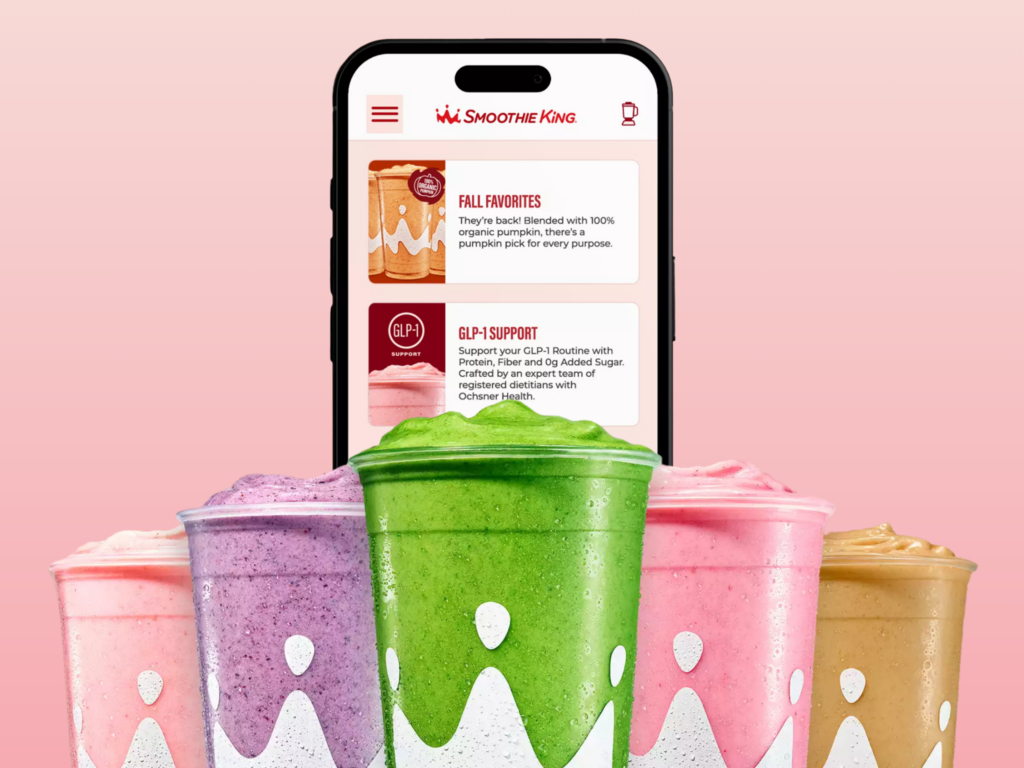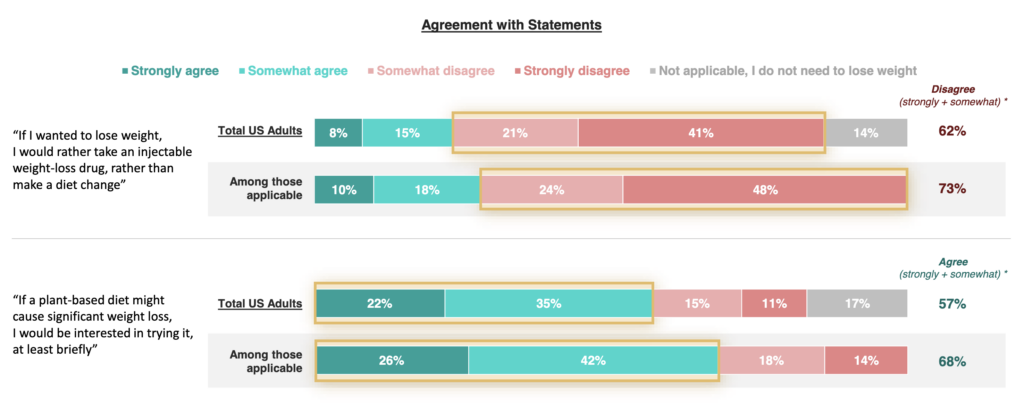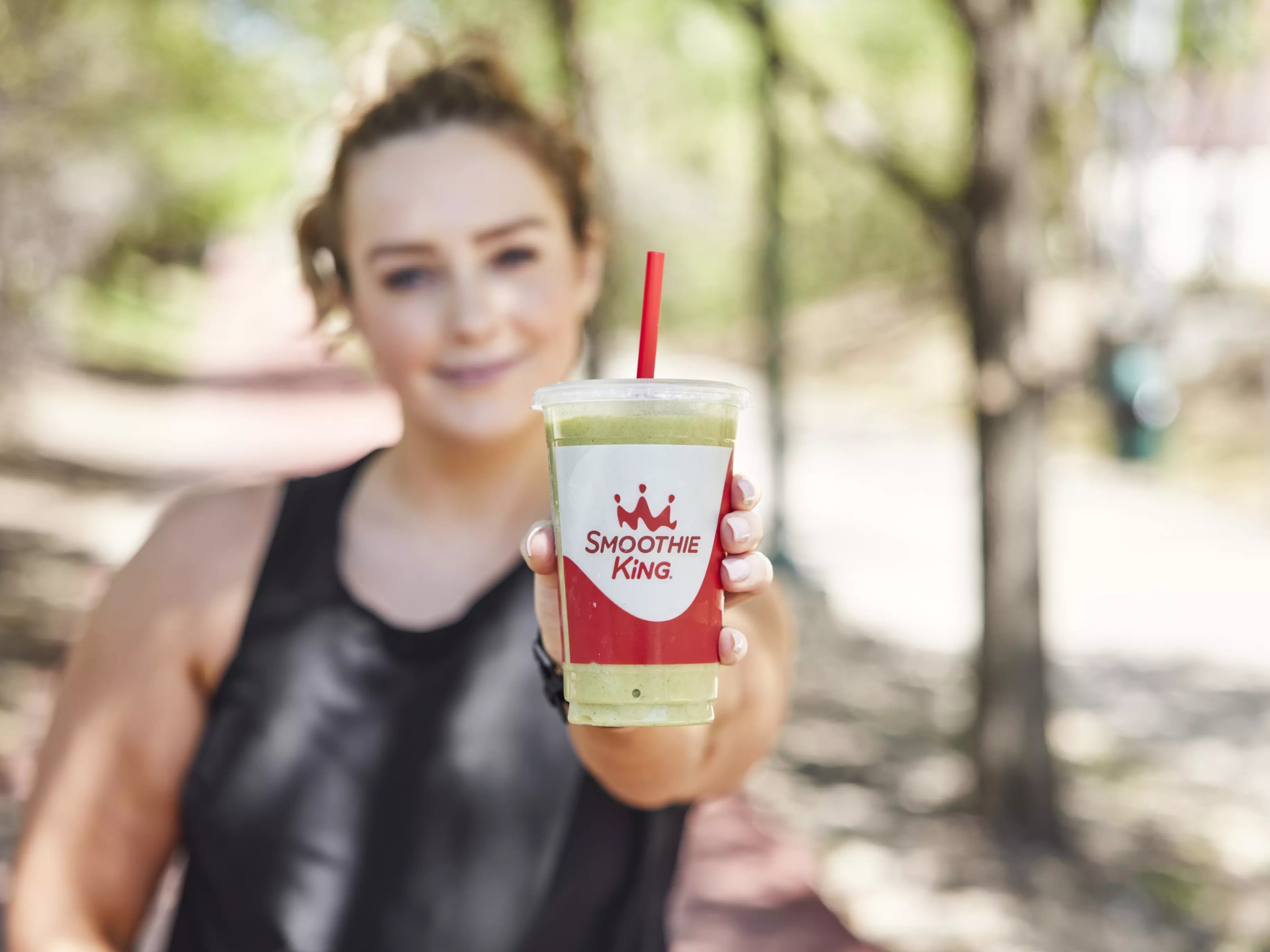Smoothie King Responds to Ozempic Users’ Demand with GLP-1 Support Menu, But Misses One Key Trend
5 Mins Read
Popular chain Smoothie King has introduced a GLP-1 Support Menu for customers on drugs like Ozempic and Wegovy, but the lack of plant-based options is a big miss.
As Ozempic continues to reshape the food industry, Smoothie King is responding with a new menu dedicated to Americans who use GLP-1 agonist drugs.
It is the first instance of a quick-service restaurant brand introducing a menu dedicated to US consumers taking these weight-loss medications, over 60% of whom are spending less on restaurants and takeout.
The GLP-1 Support Menu comprises five smoothies developed in partnership with Molly Kimball, a registered dietitian at Ochsner Health who leads a programme highlighting nutritious meal options at popular restaurants. The menu is said to prioritise nutrient density and hydration, and better help individuals experiencing the side effects of medications like Ozempic, Wegovy, Mounjaro, and others.
“We know that every individual’s path is different, and with the rising use of GLP-1 medications across the country and our customer base, we want to ensure that Smoothie King provides the nutritional resources to match,” said Wan Kim, CEO of Smoothie King, which has nearly 1,200 locations nationwide.
But none of the new smoothies are vegan-friendly, which feels like a miss considering many Americans prefer dietary shifts over medications to manage their weight goals.
Smoothie King’s GLP-1 Support Menu hits key trends…

The new smoothies include a Keto Champ option with chocolate or strawberry flavours, Power Meal Slim, and a GLP-1 supportive version of its Gladiator offering. They contain between 19g and 61g of protein per serving, up to 14g of fibre, and no added sugar.
This ties in with consumer trends. A 3,000-person survey found that the two nutrients Americans are most interested in consuming are protein (71%) and fibre (64%) – and these figures have increased from the poll’s 2023 edition.
“When developing this menu, it was important to offer blends with a thoughtful balance of nutrient-dense, high-protein, fibre-rich foods to support satiety and muscle mass. We were also mindful of sugar – each smoothie on the menu contains zero grams of added sugar,” said Kimball.
Research by food manfacturing giant ADM has found that 78% of GLP-1 users feel full more quickly, and a similar number (74%) are open to trying new foods. Meanwhile, 83% find products specifically marketed as supportive of people on GLP-1 medications appealing.
These people have specific needs when it comes to the food and drink products they choose to consume. For example, 44% often feel less hydrated, while GLP-1 users are paying more attention to protein (with 64% saying so), added sugar (57%), and fibre content (51%). These are all trends Smoothie King’s new GLP-1 Support Menu is playing into.
As of March, 21% of US users of weight-loss drugs had been spending more on protein in the previous six months. And only 5% of adults meet the daily requirement of fibre intake, with the average consumption half this amount, despite the link between fibre-rich diets and lower risk of obesity and other conditions.
“The featured smoothies incorporate essential ingredients to support the effectiveness of GLP-1 and promote overall metabolic health for all individuals, whether they’re taking GLP-1 medications or just looking for a hydrating, protein-rich smoothie option,” she added.
…but misses a massive opportunity

While most of these smoothies contain plant-based ingredients like Califia Farms’s almond milk, fresh fruit, almond butter, and coconut water, none of Smoothie King’s propreitary protein blends are vegan, since they contain dairy and/or eggs.
The Ozempic-friendly smoothies may be hitting on a range of consumer trends, but not catering to plant-based needs is a missed opportunity. The ADM poll found that over two in five Ozempic users are intentionally increasing their intake of vegan proteins.
And last month, a separate survey by Morning Consult and the Physicians Committee for Responsible Medicine found that 62% of Americans would rather make a dietary change than take an injectable weight-loss drug if they wanted to lose weight. And 57% expressed interest in trying plant-based diets if they could cause significant weight loss.
Gen Zers show preference to take weight-loss drugs over dietary shifts, but they’re also among the most likely to be open to trying vegan food for weight management. Smoothie King, which has been keenly courting Gen Z consumers, would do well to serve these needs with fully plant-based options to complement the support for GLP-1 use.
It has become the latest food company to shake up its offering to cater to an American market where 30 million people have tried GLP-1 agonist drugs already, a number that could reach 100 million – or 40% of the population – in the coming years.
Nestlé, the world’s largest food company, introduced the new Vital Pursuit brand specifically for Ozempic users, alongside a dedicated website to provide nutritional support for people on weight loss programmes, including GLP-1 medication users.
Conagra Brands, parent company of Birds Eye, Gardein and Mrs. Butterworth’s, is now selling more products catering to people on weight-loss drugs. And Kroger’s health division has revamped its weight management programme to offer patients access to drugs like Wegovy and Zepbound.
Meal kit startup Daily Harvest began offering a GLP-1 companion collection of dishes, and supplement retailer GNC has introduced a nutritional support section for GLP-1 users, selling protein powders and fibre-loaded products.
And ADM itself has built a supportive solutions platform for users of anti-obesity medications, leveraging its ingredient pantry and product development capabilities to offer over 25 market-ready GLP-1 complementary food and supplement concepts for its customers.



